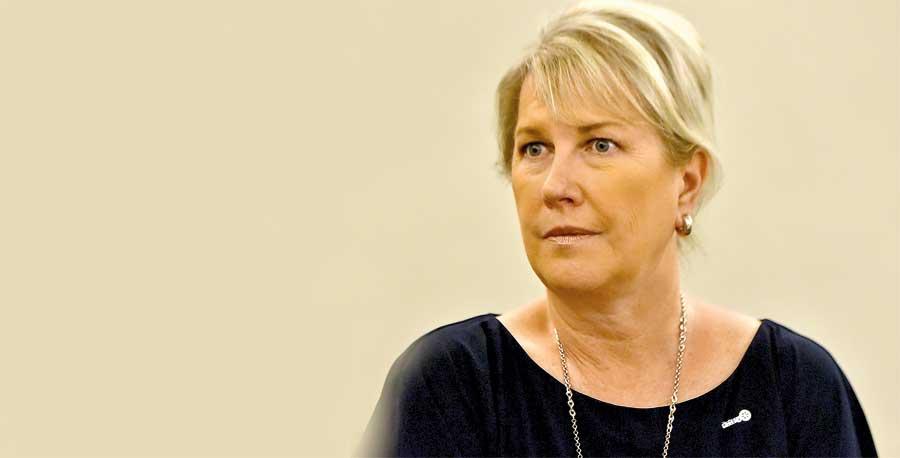Reply To:
Name - Reply Comment

Jennifer Jones Rotary International President
pic by Kithsiri de Mel
“Imagine a world that deserves our best where we get up each day knowing that we can make a difference,” says the first female president-elect of Rotary International, Jennifer Jones. Jones, the first female president in the Rotary’s 117-year history, made a tour of Sri Lanka from December 11-15 because she selected Sri Lanka as one of the countries to visit on her global ‘Imagine Tour of Jennifer Jones.’ The tour was in line with the Rotary theme for the year, “Imagine Rotary,” as she urged people to dream big and harness the power of Rotary to turn those dreams into reality. During her tour to Sri Lanka, Jones officially launched many key projects and engaged in Rotary’s ongoing flagship projects. One of the highlights of Jones’ visit was handing over the first consignment of urgently required medicines to the Ministry of Health. The medicines are part of a $10 million Life Line project that is funded by Rotary for the people of Sri Lanka in partnership with UNICEF. In addition, given the importance of youth, Jones presented IT scholarships to selected youth as part of Rotary Sri Lanka’s programme to provide 500 IT scholarships together with the Sri Lankan embassy in the Philippines, with the partnering organization being the National Youth Council, Ministry of Youth Affairs.
difference,” says the first female president-elect of Rotary International, Jennifer Jones. Jones, the first female president in the Rotary’s 117-year history, made a tour of Sri Lanka from December 11-15 because she selected Sri Lanka as one of the countries to visit on her global ‘Imagine Tour of Jennifer Jones.’ The tour was in line with the Rotary theme for the year, “Imagine Rotary,” as she urged people to dream big and harness the power of Rotary to turn those dreams into reality. During her tour to Sri Lanka, Jones officially launched many key projects and engaged in Rotary’s ongoing flagship projects. One of the highlights of Jones’ visit was handing over the first consignment of urgently required medicines to the Ministry of Health. The medicines are part of a $10 million Life Line project that is funded by Rotary for the people of Sri Lanka in partnership with UNICEF. In addition, given the importance of youth, Jones presented IT scholarships to selected youth as part of Rotary Sri Lanka’s programme to provide 500 IT scholarships together with the Sri Lankan embassy in the Philippines, with the partnering organization being the National Youth Council, Ministry of Youth Affairs.
Jones has received several awards, including Rotary’s Service Above Self Award, Citation for Meritorious Service, the YMCA Peace Medallion, and the Queens Diamond Jubilee Medal.
During her visit to the island, Jones sat with the Daily Mirror outlining the importance of community projects and passing the message that Sri Lanka is not alone in its economic recession, but the global eyes are upon the island.
Excerpts of the interview-
 Q How do you feel about breaking the glass ceiling by becoming the first female President of Rotary International?
Q How do you feel about breaking the glass ceiling by becoming the first female President of Rotary International?
I am very honoured and feel privileged to be in this position. And also, I take pleasure in serving as the first female Rotary International President. Most importantly, I think that it does help to break down stereotypes, perhaps in our organization or anywhere else. Often in our organization, it is seen as being male-dominated. At this point in time, 26% of our membership is female. So with me being the first female president, I hope that, in some ways, it will inspire other women and perhaps other men as well to think that it looks a little different and that breaking down stereotypes is possible. It will be an eye-opening juncture where females will think that if she can do it, so can I.
Q What are the challenges you are possibly going to face in this capacity?
In terms of the gender issue, one of the facts that I am enormously proud of is that when I was selected by the nominating committee, which comprised 17 individuals, primarily men, they highlighted the fact that they picked me not because of my gender, but solely based on my qualifications. And I hope that we can arrive at a place in our world where we start to look at positions from that perspective, looking for the best person regardless of gender. We have to work more within our organization as well as elsewhere to bring more women in and showcase that women, too, are capable of handling responsibilities.
Q What are your unique plans for Sri Lanka at this crucial juncture?
As we all know, Sri Lanka is undergoing a critical phase for the first time in history, primarily based on the economic crisis and a few other crises. We exist in a world with not more than 200 countries in terms of geographical areas. So whatever that is happening in the world has a direct impact on us as we have Rotary members across the globe, and whatever that is globally happening eventually becomes personal for us. Even than watching the news, I get information from our members; therefore, I have an in-depth understanding of what is happening, and therefore the Sri Lankan crisis has become highly personal to us.
And so consequently, me being here at this point in time, I am very hopeful that it sends the message that the rest of the world has been watching, has been certainly thinking deeply and profoundly about the people of the country here. And with this visit, I am hoping to signal a gesture of support, strength, and inspiration at a time when I believe everyone needs it.
I know that certainly these have been very challenging times, and within our organization, our members here are working tirelessly to make sure that projects are strengthening the local community.
And one of the projects in particular that we looked at during the visit is the partnership between the Ministry of Health with Rotary and UNICEF to provide critical medicines to people on the frontline. Our members have also been dealing with food security issues and trying to ensure that people are taken care of at this point in time.
Q Why did you choose Sri Lanka as a country on your first official visit?
Coming to Sri Lanka was important to me first and foremost because I have been here before and I am familiar with the country. And also, having been here and knowing friends here, knowing that there are battling troubling times, motivated me to visit this beautiful country. I consider it a privilege to be here and show that the eyes of the world are genuinely upon the people of this country and to let everyone know that you are not alone and that global hands are here to support you.
I think that Sri Lanka is far enough out of the economic crisis that tourism can return in earnest, and those are critical dollars that need to come back into the economy to help businesses that have been struggling to get back on their feet again.
Resilience is one of the chief characteristics that I have observed in Sri Lankans. To add to that, Sri Lankans are innovative and going to the softer side; Sri Lankans are kind even while battling economic turmoil. Therefore I have seen the best of people, which means that there is a sense of hope and better days are coming.
Q There is a perception, especially in developing countries, that Rotary is an elitist organization and rich people can join that. What’s your take on this and do you hope to change this, or how would you tackle this misconception?
Some might say Rotary is elitist, and that is a stereotype perhaps for the organization. We are an invitation organization and I think because of that some might perceive this as an elitist organization. We are looking for people of excellence in this organization, and we do not apologise for that. We want good people in our organization, People of purpose, influence, and action. But sometimes, when our organization is called elitist that, to me, sounds like an older person who has attained a certain status.
When we say it is someone of influence, that can be a 25-year-old who is breaking new ground. Look at the tech market; look at all the different great thinkers who are our young people. Do we want them in our organization? of course we do. So we want to make sure that we are attracting the best and the brightest but not at the point of being elitist, but to the point of being discerning and wanting excellence.
Q What is your message to young people wishing to join Rotary?
We have a large cohort of young people in our organization, more than 200,000 under the age of 30. Therefore the best message that I can provide to them is that we are a wonderful place for them to come for leadership development and personal growth.
And not only for young members, but members of any age to be quite candid. I want to redefine it as “young thinkers” . We do not want to be counted out in our 40s, 50s, or 60s. We all have the ability to think young. So Rotary is the ground for any person to become the best of themselves that one can possibly be. And that potential to grow as individuals is a lifelong journey. Rotary is a wonderful opportunity for youngsters to find mentors. But those of us who have been longstanding members are also aspiring to learn from them.
Q What are your plans for extending the Rotary brand and projects worldwide?
During the past 12 years I have been working very hard on our Rotary brand and for the consistency of the brand, which is critically important for people to recognise who we are and what we do. And so going around making sure that our clubs, our partners, and our members understand our brand’s strength is very important. And then adding to that, being able to go out into the world on this “imagine” impact tour, helping to teach people how to tell their stories, is the best of the brand, in my opinion. When people can speak from their hearts about how they’ve changed someone’s life that can create a lot of inspiration. Therefore, I consider storytelling as an avenue to translate one’s experiences to pass knowledge from one end to the other, which in turn is the best for our brand.